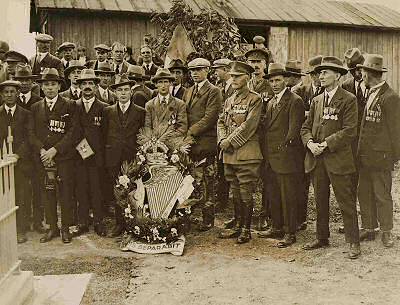|
To the Hampshire Regiment
At the start of 1918 some 72 survivors of the 317 original
volunteers joined 2nd Battalion, The Hampshire Regiment.
Led by Captain Cyril Ogier, the last remaining officer
of the six that had left with the Contingent nearly three
years before, they spent the next few months in Belgium
assimilating into their new battalion. In April they were
hurriedly sent south to positions near the French town
of Bailleul to help stem a massive German offensive threatening
the whole British position in Belgium. The fighting went
on for several weeks as the Germans sought desperately
to break through, and Allies fought desperately to stop
them. It was a close thing, but in the end the British
line held and the Germans forced to turn their attention
elsewhere.
For much of the rest of that summer, 2nd Hampshires remained
in Belgium in positions near to Messines Ridge. In September
and October, following a series of Allied victories further
south, they took part in an offensive later called "The
Advance into Flanders". As German strength and resolve
weakened, this attack was able to push them back from
around the town of Ypres once and for all, and helped
pave the way to the war finally coming to an end in November.
This final year of the war was one of most decisive, and
also one of the mostly costly. For the remnants of the
Contingent it meant another 11 dead that year, with the
last being killed only a couple of weeks before the war
ended.
|
|
After the War
In early 1919, those members of the Contingent still
serving in the Hampshires and other units, or from Prisoner
of War Camps, came home. Sadly, and in contrast to the
day they left, there was no welcoming committee of dignitaries
or crowds of flag-waving people.
In the end, the Jersey Contingent had become just another
element of the homogenous mass of soldiers that left the
Island to serve their country, and returned when it was
over in dribs and drabs. But the men of the Contingent
were determined to remain recognisably independent. Soon
after returning an association was formed, and called
with perhaps a sense of irony, "The Original Jersey
Overseas Contingent Association".
A great effort was made in the years that followed to
maintain the bond of friendship and support that had grown
during the war. The association lasted until 1979 when
the five surviving members of the Contingent officially
met for the last time. With family and friends, they toasted
the memory of the Jersey Contingent, and consigned its
story to history.
|

Former Contingent members attending a ceremony at
Guillemont in 1924
|